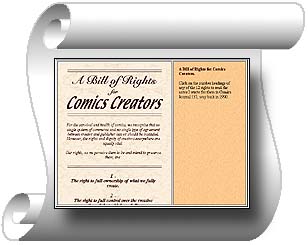The Creator's Bill of Rights
...was written in November 1988 for a two day "Summit" of comic book artists held in Northampton, Massachusetts. The meeting had been suggested by Cerebus creator Dave Sim and hosted by local heroes Kevin Eastman and Peter Laird, creators of the Teenage Mutant Ninja Turtles. The Summit was a follow-up to a July meeting in Toronto which produced a "Creative Manifesto." Some of us found the Manifesto a bit scattered, so I wrote a rough draft of a proposed replacement. That replacement, "A Bill of Rights for Comics Creators" was accepted quickly at Sim's suggestion. The rest of that day was a non-stop argument about the document's wording.

Drawn group shot, based on a photo, of the Summit participants from Reinventing Comics, Chapter Two. (Zoom in for more detail and a list of participants.)
The Bill never generated much noise in the industry and I wouldn't want to exaggerate its influence, but it provides an interesting snapshot of our attitudes at the time, and of the climate that was fueling self-publishers, progressive business people, and artists trying to reinvent the comics industry. A few years later, several top-selling Marvel artists would break from the pack and form a new company called Image, shifting the debate from rights and principles to clout and competition, but both developments would share a common premise, still relevant today: that comics creators already have the right to control their art if they want it; all they have to do is not sign it away.
I was invited in large part because I knew Laird and others through an APA I'd created called The Frying Pan. At my suggestion, Beanworld creator and "Nexus of all Comic Book Realities" Larry Marder was invited too. Larry flew out from Chicago to our place in Arlington, Massachusetts shortly before the meeting. I had the rough draft of the Bill ready but not typed yet. I vividly remember hammering it out on my old manual typewriter as Larry read my notes back to me, right before we rushed out the door to catch a succession of buses and trains to Northampton. While waiting for the bus in Springfield, we found a copy shop and photocopied my hastily typed hand-out. It was also on that trip that I showed Larry my notes for a comic book about comics that I had been working on for a few years.
After the first day of debates, everyone stumbled out of the Hotel Northhampton into the cold New England air to walk the five or so blocks to dinner. I remember Larry and I lagged behind a little. I had argued with Dave Sim about every imaginable issue that day as if my life depended on it, but walking to dinner, it all seemed pretty distant already. Larry and I talked more about my notes for the comic book about comics. I asked him if he thought those ideas would mean a lot more in the long run than anything I could accomplish in Northampton. He said yeah, they probably would.
When those notes became Understanding Comics it was Kevin Eastman's money that paid me to finish it – money he and Peter had earned because they refused to give away their creation the way so many artists had before them.
HTML Nostalgia Trip: Click left to open the full text of my proposed final draft of the Bill with annotations, in its original frame-based format from 1999 ('cause I'm too lazy to reformat it). Close window to return.
Further Reading: Al Nickerson's Ya Can't Erase Ink, hosted an extensive look back at the Bill of Rights with interviews with participants and some lengthy (and intense) discussions about its history and implications.
Finally, this postscript arrived from Jonathan Fine at Yale a few years back:
"You might be pleased to learn that you were a part of the law school curriculum in intellectual property. I mentioned your comics to a friend who was a visiting scholar here and she said your name sounded familiar. A bell went off (metaphorically) when I said that you'd done a bill of rights for comic artists. She let me know that this year's class in intellectual property had had your bill of rights assigned, and that they spent some time discussing it."
What a long strange trip it's been...
